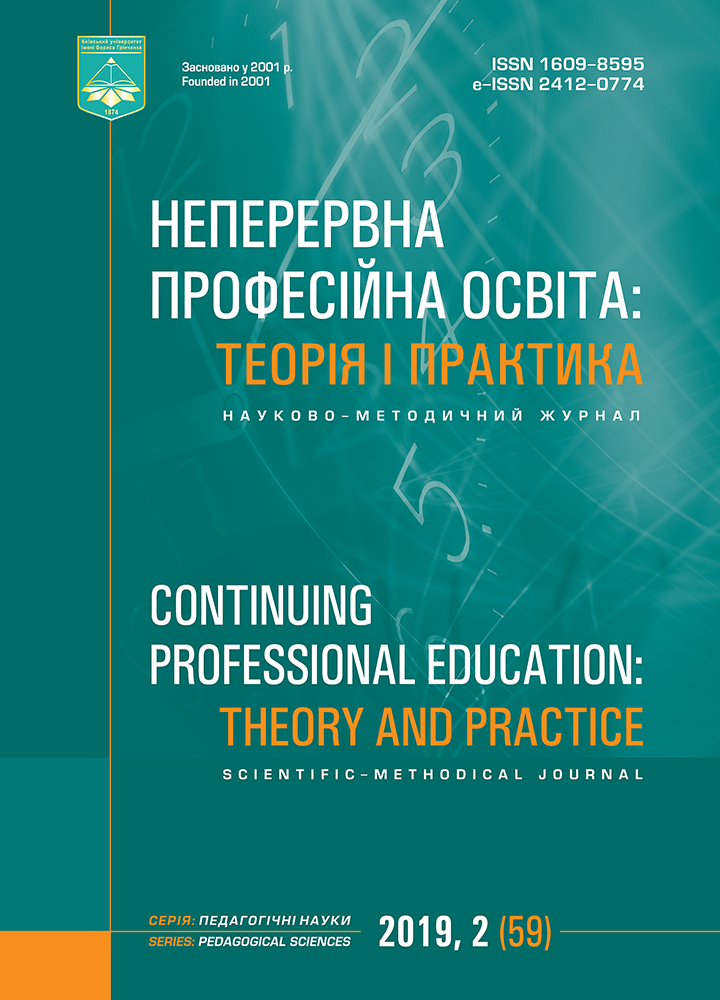PHENOMENON OF THE QUALITY OF EDUCATION: THE BAROQUE EPOCH
DOI:
https://doi.org/10.28925/1609-8595.2019.2.7277Keywords:
baroque epoch, quality of education, Septem Artes Liberales.Abstract
The paper reviews recent approaches to the evaluation of education quality. The critical view of education quality in Ukraine today and its phenomenal success in the age of baroque is represented. Considerations for characteristic features of the education philosophy are founded on the analysis of Ukrainian and foreign authors’ works. The conclusions concerning the reasons of the complications with the correct approach to evaluation of education quality on one hand and disadvantages of highly specialized education and its consequences on the other, outline the main issues of the article. The phenomenon of education quality of baroque age was reviewed from the position of the European educative system of Septem Artes Liberales. The Kyiv Mohyla Academy in XVII–XVII centuries was chosen as the most specifically Ukrainian historical example. The article indicated the importance of the formation of kinship of ideological foundations in the environment of educated aristocracy and the problems of both assessment of education quality and the degree of conformity of education to different social requirements. The comparison of cooperation of nowadays and baroque epoch erectors (as the architect and the customer) confirms big gap in their worldviews. Baroque’s education, its phenomenon, or rather the phenomenon of its quality, and calling things in terms of the industrial age – efficiency and effectiveness, is the topic with enormous practical potential in terms not only and perhaps not so much of the historical point of view, when the purpose of the researcher is to study the past in search of «white spots», but also in terms of searching for the ways of preparing the successful «golden age» educators. The model suggested is suitable for realisation in modern Ukrainian education processReferences
Andrushhenko, V. P. (2012). Problema formuvannja novogho vchytelja dlja ob’jednanoji Jevropy XXI stolittja [Тhe problem of a new teacher’ forming for united Europe in ХХІ century]. Jevropejsjki pedaghoghichni studiji, 1–2, 27–39 (ukr).
Ministerstvo osviti i nauki Ukrayin i [ Ministry of Education and Science of Ukraine] Official web-site (2019). Retrieved from https://www.google.com/url?sa=t&rct=j&q=&esrc=s&source=web&cd=3&cad=rja&uact=8&ved=2ahUKEwj8yMvq57jhAhXwwosKHaLnDEMQFjACegQIAhAB&url=https%3A%2F%2Fmon.gov. ua%2Fua%2Ftag%2Fyakist-osviti&usg=AOvVaw1p3myqMhZeyh-UBNgaf1dq (ukr).
Askochenskij, V. I. (1856). Kiev s drevnejshim ego uchilishhem Akademieju [Kyiv with its oldest Academy]. Kiev, Ukraine: v Univ. tip. (rus).
Batechko, N. (2017). Fenomen jakosti osvity v suchasnomu naukovomu dyskursi [Phenomenon of the quality of education in modern scientific discourse]. Osvitologhichnyj dyskurs, 3–4 (18–19), 1–16 (ukr).
Bodrijjar, Zh. (2000). Prozrachnost’ zla [The Transparency of Evil]. Moskow, Russia: Dobrosvet (rus).
Bolhovitinov, E. (1825). Opisanіe Kіevosofіjskago sobora i kievskoj іerarhіi [Description of the Kievosophiyskaya Cathedral and Kiev hierarchy]. Kiev, Ukraine (rus).
Bulgakov, M. (1843). Istorija Kievskoj akademii [The history of the Kyiv academy]. Saint Petersburg, Russia: Tip.
Zhernakova (rus).
Finikov, T. V. et al. (2012). Vkhodzhennja nacionaljnoji systemy vyshhoji osvity v jevropejsjkyj prostir vyshhoji osvity ta naukovogho doslidzhennja: monitorynghove doslidzhennia: analitychnyj zvit Mizhnarodnoho blaghodijnoho fondu «Mizhnarodnij Fond doslidzhen osvitnoyi politiki» [The introduction of the national higher education system into the European space of higher education and research: monitoring research]. Kyiv, Ukraine: Takson (ukr).
Liotar, Zh.-F (1995). Sytuacija Postmodernu [The Postmodern Condition]. Filosofsjka i sociologhichna dumka, 5–6, 15–38 (ukr).
Loghvyn, Gh. N. (1998). Ivan Zarudnyj – vydatnyj ukrajinsjkyj mytecj [Ivan Zarudnyj – the outstanding Ukrainian artist]. Zbirnyk naukovykh pracj Derzhavnogho naukovo-doslidnogho instytutu teoriji ta istoriji arkhitektury i mistobuduvannja, 3, 70–90 (ukr).
Mycyk, Ju. A., Nichyk, V. M., & Khyzhnjak, Z. I. (2014). Svjatyj Petro Moghyla [Saint Petro Mohyla]. Kyiv, Ukraine: NAN Ukrajiny (ukr).
Mozgovaja, E. B., & Zarudnyj, I. P. (1981) Materialy k biografii hudozhnika [Materials to the biography of the artist].
Problemy razvitija russkogo iskusstva, 14, 33–40 (rus).
Ortegha-i-Ghaset, Kh. (1994). Vybrani tvory [Selected Works]. Kyiv, Ukraine: Osnovy (ukr).
Grabarj, I. Je. (Ed.). (1954). Russkaja arhitektura pervoj poloviny XVIII veka [Russian architecture in the first half of the XVIII century]. Moskow, Russia (rus).
Bondarenko, I. A. (Ed.) (2008). Slovar’ arhitektorov i masterov stroitel’nogo dela Moskvy XV – serediny XVIII veka [Dictionary of architects and masters of the Moscow building business of the XV–the middle of the XVIII-th century]. Moskow, Russia: LKI, 25 0–252 (rus).
Toffler, E. (2000). Tretja khvylja [The Third Wave]. Kyiv, Ukraine: Vsesvit (ukr).
Kostjuk, O. Gh., Fedoruk, O. K. (Eds.) (1991). Ukrajinsjke barokko ta jevropejsjkyj kontekst [The Ukrainian Baroque and the European context]. Kyiv, Ukraine: Naukova dumka (ukr).
Khalebsjkyj, P. (2009). Ukrajina – zemlja kozakiv: podorozh. Shhodennyk [Ukraine – the land of the Cossack: the dairy]. Kyiv, Ukraine: Jaroslaviv Val (ukr).
Tsentralnyi derzhavnyi istorychnyi arkhiv Ukrainy u m. Kyievi [Central State Historical Archive in Kyiv]. F. 168, op. 2, spr. 6. S. 6–8 zv.
Shlejkher, A. (2018). Najkrashhyj klas u sviti: jak stvoryty osvitnju systemu 21-gho stolittja [World Class – How to Build a 21st-Century School System, Strong Performers and Successful Reformers in Education]. Lviv, Ukraine: Litopys (ukr).
Aguerrondo, I. (1993). La calidad de la educación: Ejes para su definición y evaluación. Retrieved from http://www. educoas.org/portal/bdigital/contenido/laeduca/laeduca_116/articulo4/index.aspx?culture=es&navid=201 (esp).
Downloads
How to Cite
Issue
Section
License
Copyright (c) 2020 Anton Kolomiiets

This work is licensed under a Creative Commons Attribution-NonCommercial 3.0 Unported License.



